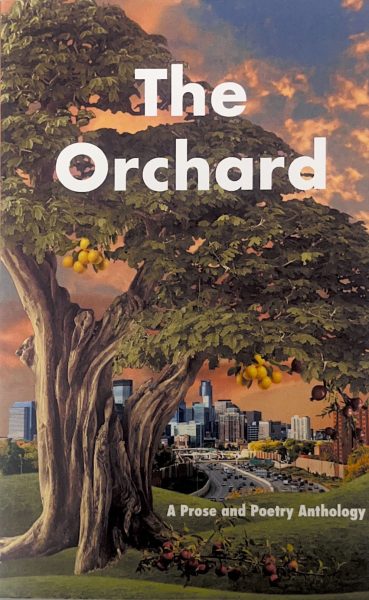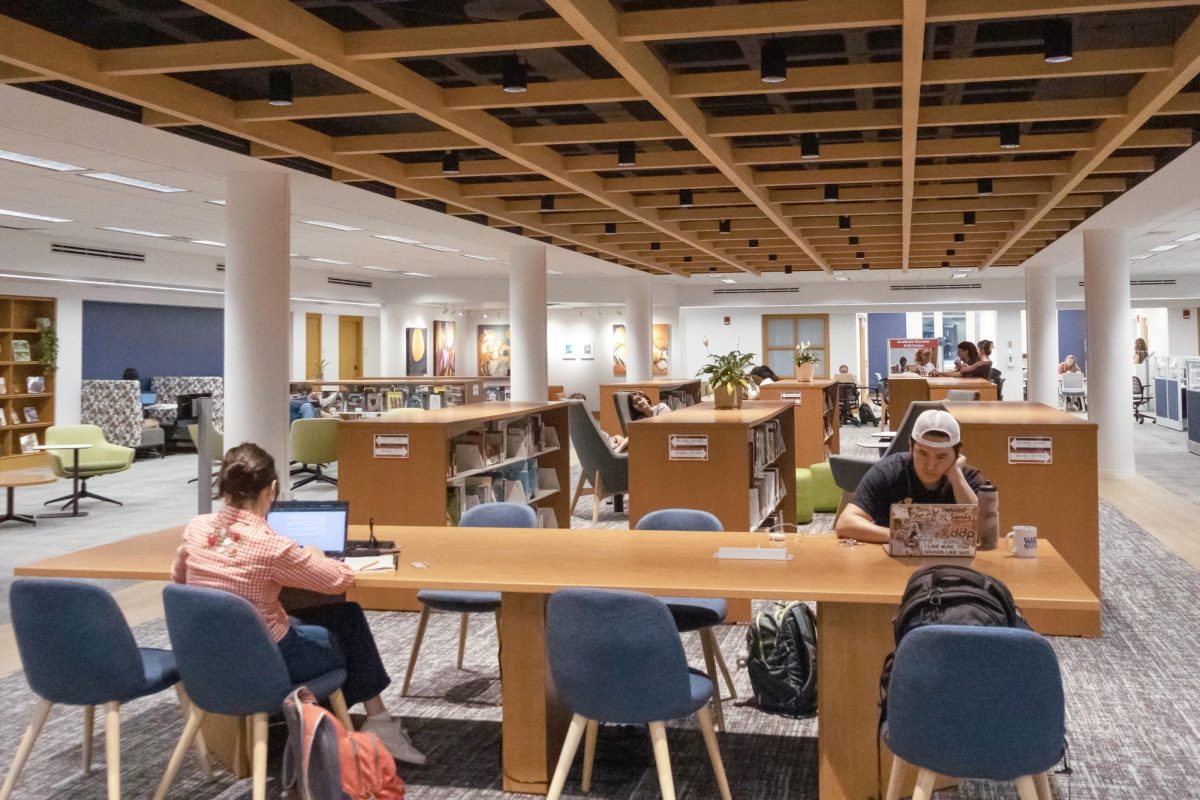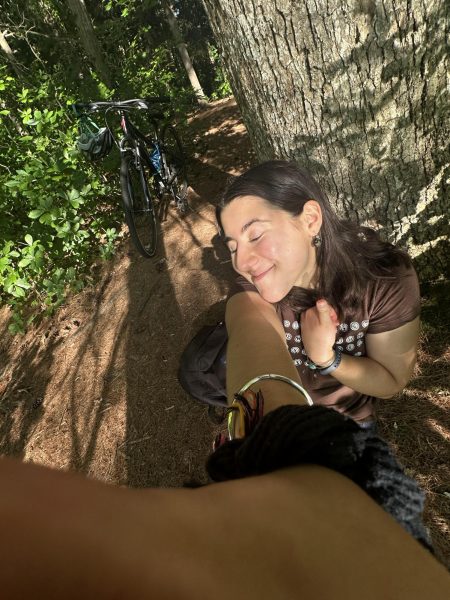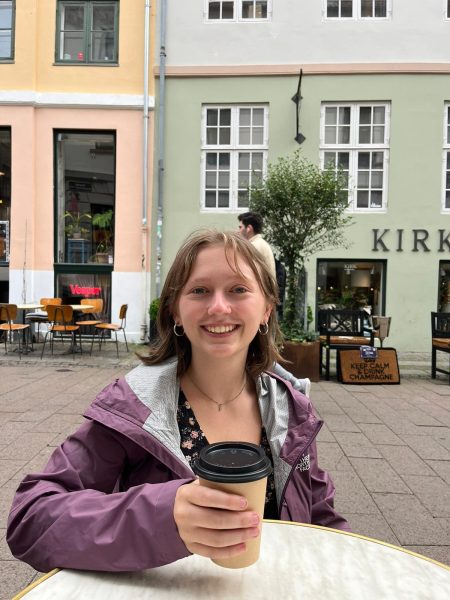
The Fall 2024 Literary Publishing class celebrated the release of “The Orchard,” the course’s third anthology at the English department coffee house on Feb. 5, highlighting the power of real-world learning applications within the humanities field and celebrating the creative skills of the class’s contributors and editors. English professor Steve Woodward, who has taught the class since 2019, reflected on the experience of watching his students’ vision come to life.
“In these pages, you’ll find engagements with the nature of reality, sharp-elbowed sportswriting, poetic musings on friends and natural disasters and stories that traverse the limits of form,” Woodward wrote in the introduction to ‘The Orchard.’ “In all of them, you’ll find roving curiosity, questing intelligence, and keen observations. These are writers who have something to say and are ready to make their mark on the world.”
Literary Publishing, which was taught by two different professors before Woodward, has gone through several iterations. Woodward introduced the anthology component in 2022. After teaching the class remotely during the COVID-19 pandemic, Woodward wanted to introduce something new. He asked his 2022 class what they would prefer, and they decided to make an anthology.
“And once that worked, I said, ‘Let’s do it again,’” Woodward recalled.
Literary Publishing is already a more pre-professional class than is often found in liberal arts humanities departments, and the creation of the anthology gives students further hands-on experience, plus a product to show for it.
“I think that anybody that works in publishing is impressed by things that are different from the norm,” Woodward said. “[The anthology is] a really good way for students to showcase their skills and to prove that they’re capable of doing real work. They can show up with a copy of the anthology in hand and say, ‘Hey, I made this thing. Had anybody else that you’re interviewing today done something like this?’”
Many of the professors who taught this class have worked in publishing in the Twin Cities. This includes Woodward, who worked in the industry for 13 years and currently edits as a freelancer.
Woodward said he “serves as a lightning rod for enthusiasm.” His role in the class is not to dictate what direction the anthology should go, but rather to excite his students about publishing and guide them through the steps of the process from gathering writing, editing and laying out the physical work.
Because the anthology is not sold, students can focus on the art rather than what can turn a profit. Woodward prioritizes shifting the narrative around the submission process within his classroom, beginning with the language they use. Instead of using the word “submission,” which Woodward feels reinforces a hierarchy of power, he gravitates towards collaboration and contribution.
“We don’t treat it like it’s some kind of romantic relationship where it hinges on acceptance and rejection,” Woodward said. “Instead, we think about it as a collaboration, which is what the true spirit of publishing actually is and should be.”
Students in Literary Publishing typically fall into three categories of interest: publishing, writing and reading. He thinks about the class from these three angles: providing experience and industry information, granting students the opportunity to get their work published and giving those who simply have a love of words insight into the behind-the-scenes processes of publishing.
At the beginning of the semester, the class forms small “publishing houses” that go through the process of designing the cover, conducting mock auctions where the publishing houses bid against each other to acquire books, as well as a sales conference where they delve into marketing and publicity.
“They come up with their own names and their own identity and their own preferences and aesthetics, and then we use those groups throughout the semester,” Woodward said. “We use those little groups as well to allow the members of the class an opportunity to understand that a lot of decisions in publishing aren’t made just on a whim, but they’re made based on what’s going to be good for this publishing house.”
Many submissions to this semester’s anthology feature common spaces and the outdoors. To highlight these focuses, students decided to entitle this semester’s anthology “The Orchard” and have the cover feature both a fruit tree and the Minneapolis skyline.
For Woodward, “The Orchard” stands out from previous semesters’ anthologies because of its multi-genre nature. In addition to over a dozen poems, the anthology features short stories, a personal essay and its first-ever sportswriting submission.
Theater & dance major Nick Suchomel ’25 decided to enroll in Literary Publishing as a means to finish their creative writing minor. Through the course of the semester, they learned the ins-and-outs of query letters and contacting agents, tools that can be used to explore a career in writing down the line.
“I’m interested in doing more writing in the future,” Suchomel said. “Taking this class felt like a step in the right direction.”
Suchomel contributed a short story to the anthology, a dystopian saga delving into the power of stories and words in a world that is losing their ability to use them. Seeing the anthology with their writing in print was a surreal experience.
“We all worked so hard to make this come together,” Suchomel said. “Getting to hold a semester’s worth of work in our hands felt amazing.”
The professional and personal skills that Jizelle Villegas ’26 learned when they took Literary Publishing in the Fall 2023 semester helped them land a remote internship with Deep Vellum, a nonprofit independent bookstore and publishing place in Dallas, the following semester.
The class taught her to be more vulnerable with her writing, increasing her confidence in a way that helped her apply to the internship.
“I got to read out loud because I wanted to, and it was a bit emotional,” Villegas said. “I’m showing myself to a group of people that I still don’t really know. This is the step I need to take as a writer to really get used to those dynamics, and this class really prepares you for that.”
Villegas also learned how to navigate the publishing industry, and the formatting and editing skills she had gained in Literary Publishing made her application stand out.
“Knowing the background of publishing helped me feel like anything can be published; it’s just [that] you have to put in the work and effort to get it done,” Villegas said.
In the 71 pages written and designed by his students, Woodward found excitement for the future of the publishing industry.
“Perhaps, reading these pages, you too will be filled with a species of hope, as I was,” Woodward wrote. “I can’t wait for you to turn the page.”













